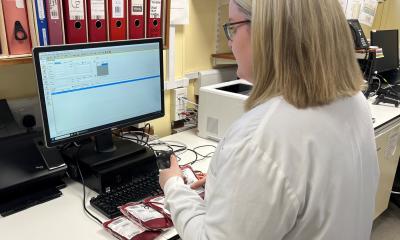Article • Pathology testing
The right tests – for the wrong reasons?
Figures show that the rates of pathology testing are continuing to rise despite a backdrop of financial constraint within the NHS.
Report: Mark Nicholls
General practitioner (GP) Dr Jessica Watson has expressed concern that some tests are being carried out for the wrong reasons – often for a non-medical purpose – and that unnecessary tests are causing increased anxiety and uncertainty rather than offering reassurance for some patients. Having researched this area extensively, at the FiLM 2018 – Frontiers in Laboratory Medicine conference in the UK this January her presentation focused on ‘What do tests do for doctors? Over-diagnosis and the psychology of testing’.
Over-zealous use of blood tests

The conundrum faced by family doctors is ‘to test, or not to test’. Watson, who is also a NIHR Doctoral Research Fellow at the University of Bristol, said: ‘It’s a fascinating question as a researcher, but more importantly as a clinician. While medical reasons are important, what fascinated me are the psychological reasons for testing.’ Concerned that such psychological reasons for tests may be fuelling over-testing and over-diagnosis, she expressed increasing concern that over-zealous use of blood test investigations could actually lead to patient harm. However, she also acknowledged that doctors often face the difficult balance between deciding whether to test or as they try to uncover underlying disease.
She pointed to variability in testing rates across the UK with areas of over-testing and areas of under-testing and suggested that both can cause patient harm. Additionally, there is the issue of how to avoid over-diagnosis, which may divert resource from more effective interventions, generate waste and inequalities and increase the workload of primary care. As part of her research outlined to delegates, she discussed interviews she had conducted with a selection of GPs about blood tests performed, and explored their motives for carrying out the blood tests.
Fear of neglect
This ranged from fulfilling non-medical roles such as a ‘gift’ to the concerned patient in return for perhaps not taking antibiotics, for example, or used as a bridge to build a ‘therapeutic alliance’ with a patient in an attempt to lead towards better patient management.
But conducting tests also managed uncertainty for the GP with fear of missing something being a common driver, as well as fear of litigation. ‘The role of the blood test can be to manage uncertainty,’ Watson said, ‘but, paradoxically, inconclusive test results can create anxiety and uncertainty.’ From there, it can lead to more tests and stress and create the ‘investigation momentum’ where further tests are constantly being sought in the relentless pursuit of unachievable certainty. Equally, normal test results can at times do little to reassure a patient. ‘While the unit cost of a blood test is relatively small, the downstream cascade of testing can be significant.’ Guidelines have also posed GPs problems because many patents do not necessarily fit guidelines, Watson continued. The importance of shared decision-making over tests, she pointed out, may lead to reduced testing, or even patients opting not to have a specific test.
However, she noted that required time and resources in explaining the benefits to a patient, evidence, education and an acknowledgement that uncertainty is inherent in testing. While defining unnecessary blood testing is not as simple as developing medical criteria and guidelines for testing, Watson concluded: ‘Over-testing harms patients, leading to a rising workload in general practice and rising costs for the NHS.’
Profile:
Dr Jessica Watson is a general practitioner (GP) and NIHR Doctoral Research Fellow at the University of Bristol in the UK with an interest in how GPs use tests in primary care. Her PhD is looking at inflammatory markers to detect inflammation in the blood. Watson’s research sets out to describe the probability of various diseases given the test results in primary care. She is a member of Bristol Population Health Science Institute, NIHR CLAHRC West, Bristol Medical School (PHS) and Bristol Doctoral College.
30.05.2018





